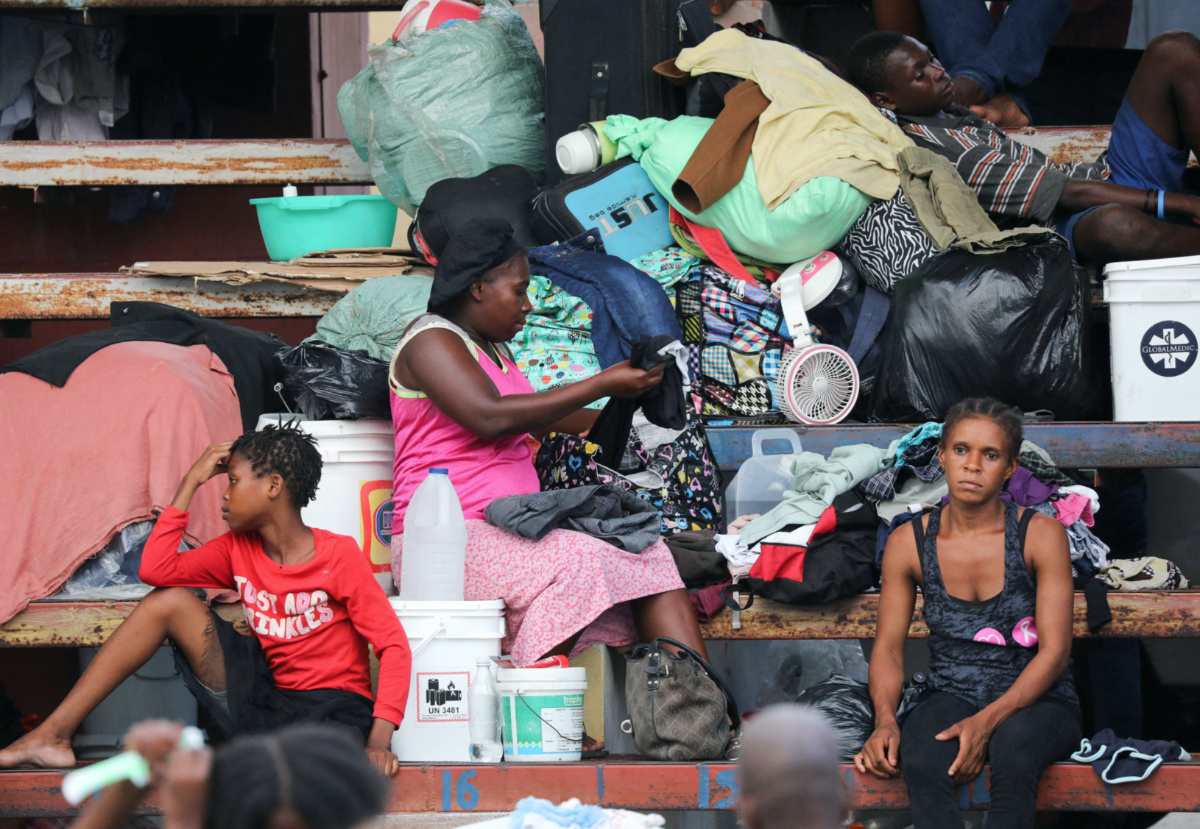Updated 5:15pm (AEST)
United Nations
Reuters
The United Nations Security Council on Monday authorised a foreign security mission to Haiti, a year after the Caribbean country asked for help to fight violent gangs that have largely overrun its capital Port-au-Prince.
“More than just a simple vote, this is in fact an expression of solidarity with a population in distress,” Haiti’s Foreign Minister Jean Victor Geneus told the council. “It’s a glimmer of hope for the people that have for too long been suffering.”

People fleeing gang violence take shelter at a sports arena, in Port-au-Prince, Haiti, on 1st September, 2023. PICTURE: Reuters/Ralph Tedy Erol/File photo
The 15-member council adopted a resolution, drafted by the United States and Ecuador, that authorizes the so-called Multinational Security Support mission “to take all necessary measures” – code for use of force.
China and Russia abstained from the vote, wary of authorising the blanket use of force under Chapter 7 of the founding UN Charter. The remaining 13 members voted in favor.
“We have stepped up to create a new way of preserving global peace and security, answering the repeated calls of a member state facing a multi-dimensional crisis amid alarming spiraling gang violence,” said senior US diplomat Jeffrey DeLaurentis.
The Security Council also expanded a UN arms embargo to include all gangs – a measure China wanted. Haitian officials have said guns used by gangs are believed to be mostly imported from the United States. The embargo previously only applied to specific individuals.
“This is a very important decision. If the council had taken this step at an earlier time, the security situation in Haiti might not have deteriorated to what it is today,” China’s UN Ambassador Zhang Jun told the council after the vote.
The response to Haiti’s request for help was delayed due to a struggle to find a country willing to lead a security assistance mission. Kenya stepped forward in July with a pledge of 1,000 police. The Bahamas then committed 150 people, while Jamaica and Antigua and Barbuda are also willing to help.
“This mandate is not only about peace and security, but also about the rebuilding of Haiti – its politics, its economic development, and social stability,” Kenya’s Foreign Affairs Minister Alfred Mutua said in a post late on Monday on his X account.
Elections
Following the council’s approval on Monday, it was not immediately clear how quickly a force could be deployed.
“Today’s vote is only the first step. Now, the work of getting the mission off the ground begins,” US Ambassador to the UN Linda Thomas-Greenfield said in a statement.
While not sending any troops, the US Government hopes to provide $U100 million to back the multinational mission with logistical and financial assistance, that could include intelligence, airlift, communications and medical support.
Countries have been cautious of supporting the unelected administration of Prime Minister Ariel Henry, who has said fair elections cannot be held with current insecurity. Haiti has been without any elected representatives since January.
The Security Council stressed an “urgent need” for Haiti to make progress toward “transparent, inclusive, and credible electoral processes and free and fair elections.”
We rely on our readers to fund Sight's work - become a financial supporter today!
For more information, head to our Subscriber's page.
The security assistance mission, while approved by the UN Security Council, is not a United Nations operation.
UN peacekeepers were deployed to Haiti in 2004 after a rebellion led to the ouster and exile of then-President Jean-Bertrand Aristide. Peacekeeping troops left in 2017 and were replaced by UN police, who left in 2019.
Haitians are wary of an armed UN presence. The Caribbean country was free of cholera until 2010, when UN peacekeepers dumped infected sewage into a river. More than 9,000 people died of the disease, and some 800,000 fell ill.
The council resolution adopted on Monday asks the countries taking part in the security mission “to adopt appropriate wastewater management and other environmental controls to guard against the introduction and spread of water-borne diseases.”
– additional reporting by SARAH MORLAND in Caracas, Venezuela, and, GEORGE OBLUTUSA in Nairobi, Kenya.






